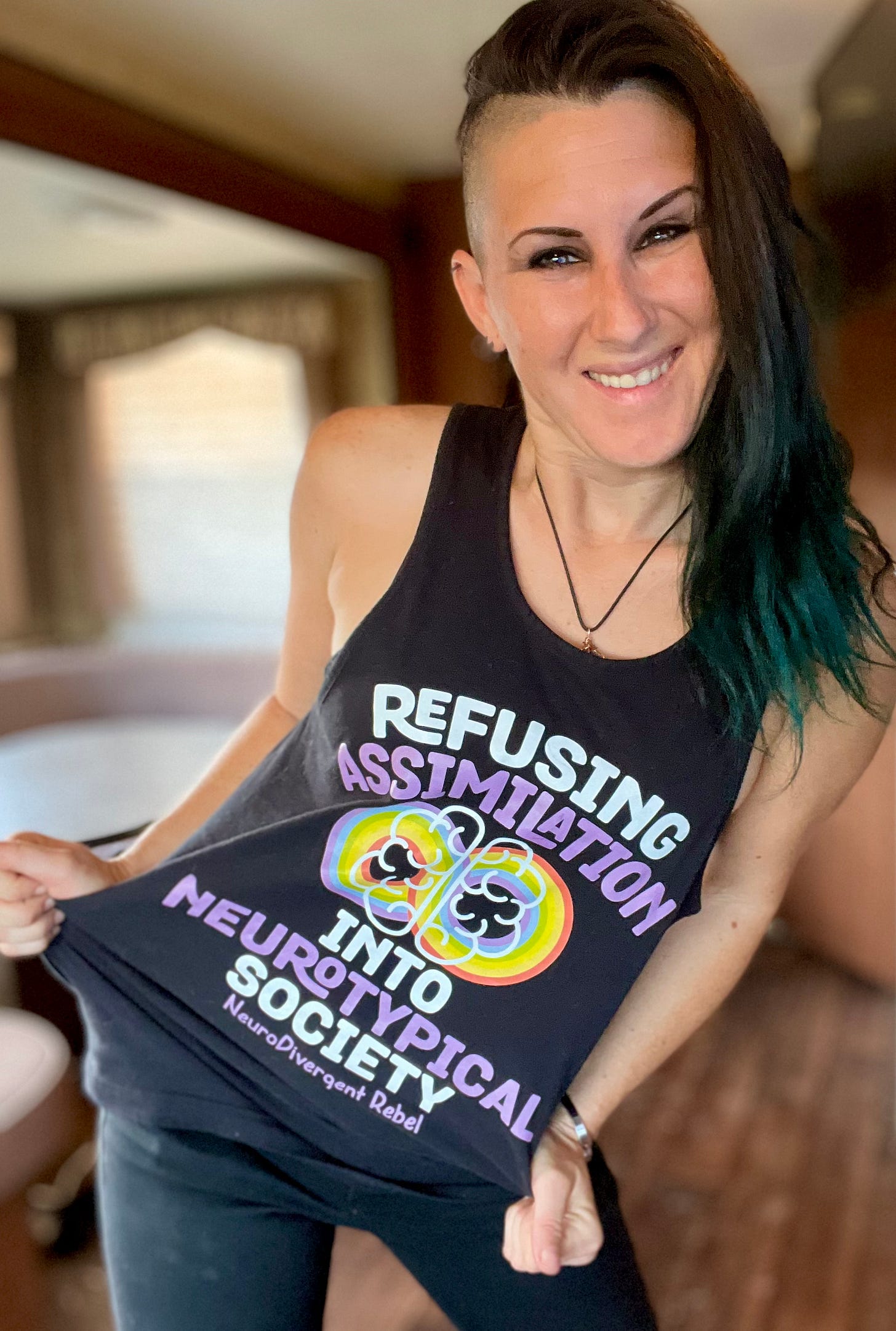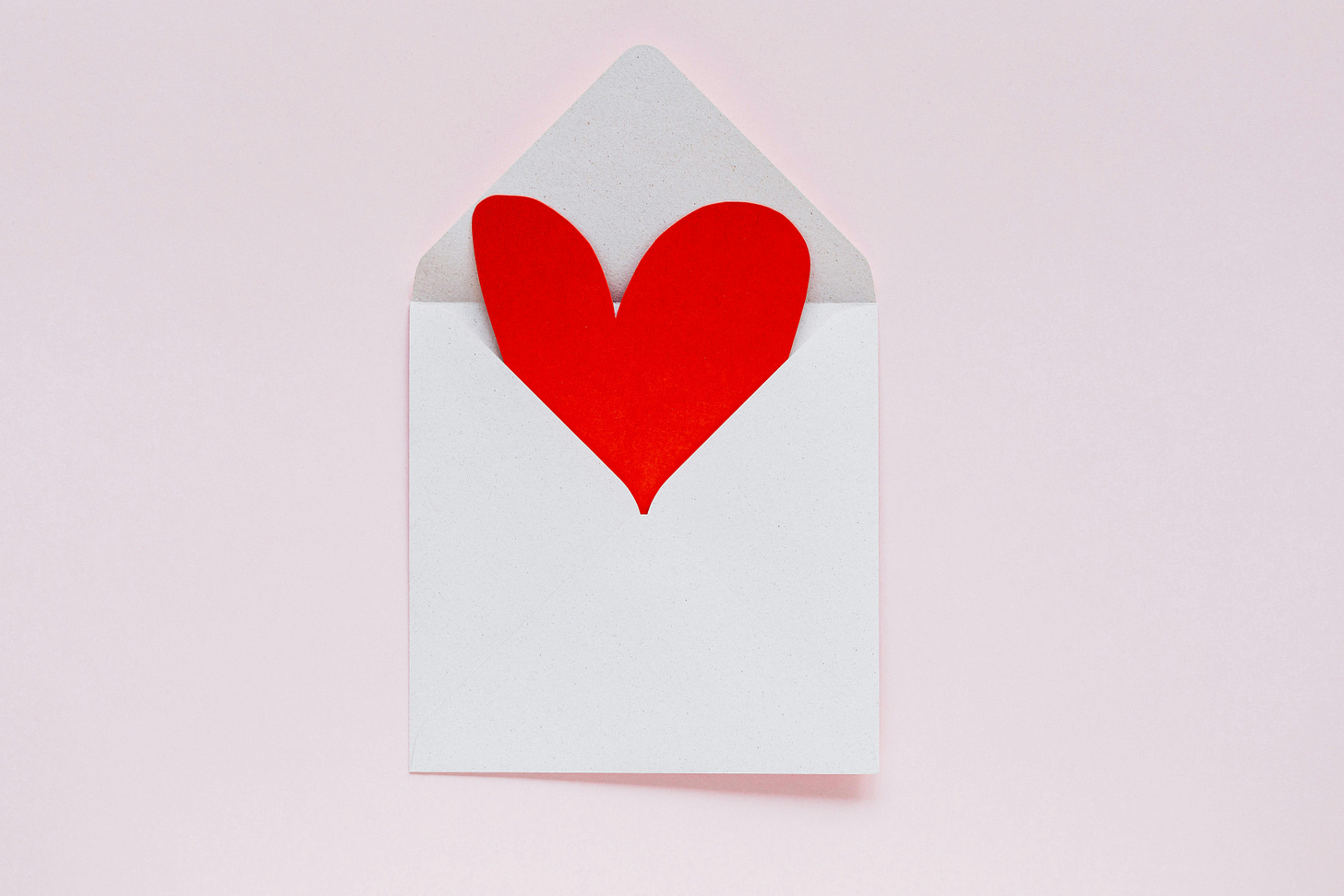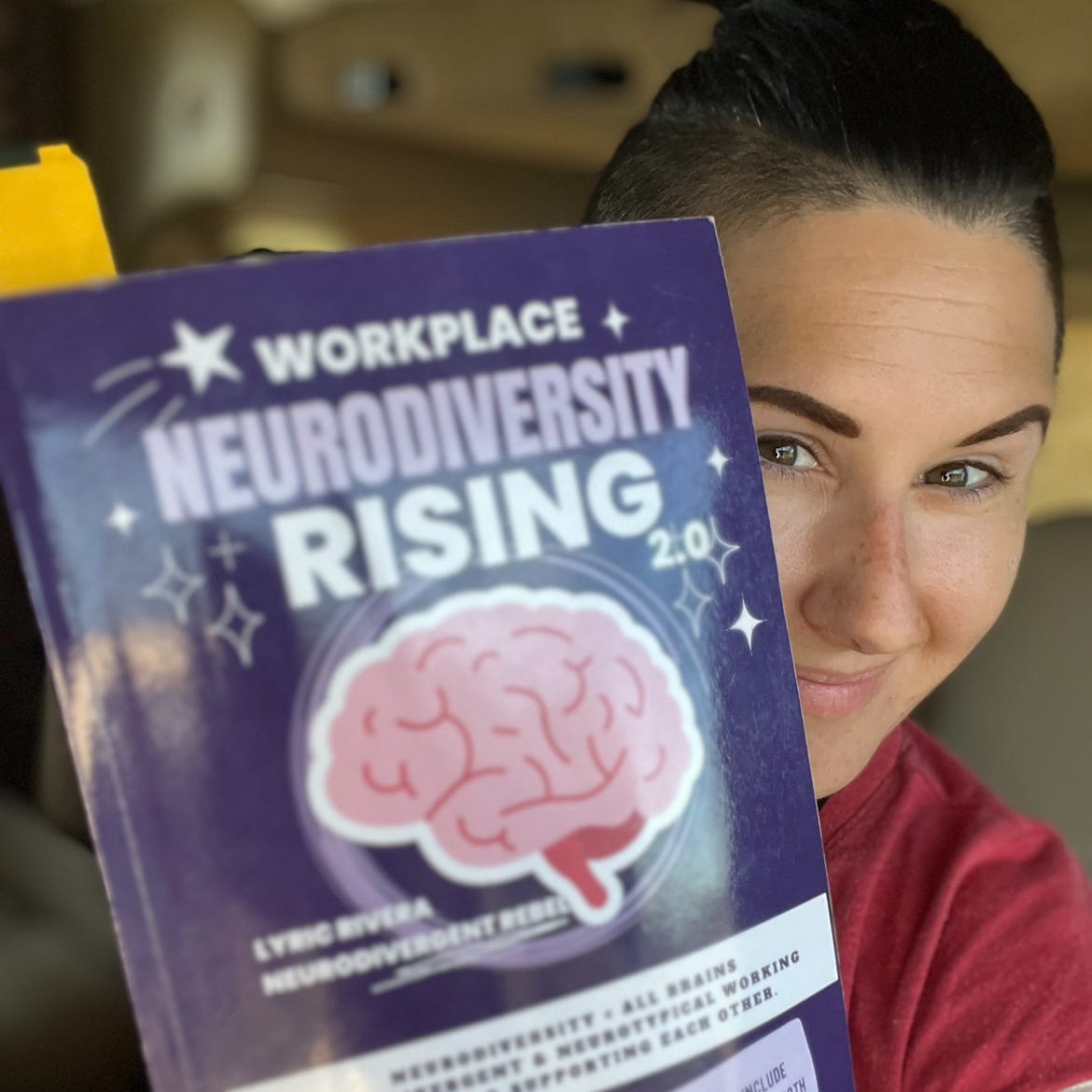Stop Telling Me My Autism Isn’t ‘Real’: Late Diagnosis Doesn’t Mean ‘Autism Lite’
Stop Speaking Over Autistic Adults – Autism Isn’t a Tragedy (But the Lies I Believed About Myself Were): They Blamed Me. They Shamed Me. Then I Discovered I Was Autistic – And It Wasn’t My Fault.
I started the NeuroDivergent Rebel blog in the fall of 2016, after being diagnosed Autistic at the age of 29.
Back then, the online "Autism World" was very different... and I was very different too.
In the early days post Autism diagnosis, I weaved in and out of all of the stages of grief (denial, anger, bargaining, depression) before finally settling into acceptance. However, I must admit that my anger did linger long after I'd accepted the truth (that I am and always have been Autistic).
Autistic Pride Wasn't My First Step
Initially, I was sad that I was Autistic (before I decided to start my blog).
Back then (when I was struggling and didn't know if I wanted to live anymore) I had no Autistic Pride, because in those days I still saw "my Autism" as the main obstacle to all the things I thought I wanted to do in my life (because I'd only been offered a narrow picture of Neuro-Noarmative success). Believing the lies I'd been told, I pushed myself mercilessly towards this impossible and unhealthy goal.
Before I understood how deeply interwoven "Autism" is into the very fabric of my being (and who I am as a person), had I been offered "a cure," I would have taken it without hesitation.
These days, now that I understand both myself and the systemic obstacles Autistic and other NeuroDivergent People face, my stance is much different (but it took time for me to get here).
Early on, I blamed myself (and when I was first diagnosed Autistic, I blamed my Autism) for all my weaknesses, struggles, and problems in life.
I hadn't yet learned that Autism was also responsible for many of my strengths (and some of the best parts of me).
Denial and Bargaining - Looking for Proof My Diagnosis Was Wrong
Eventually, once the sadness began to lift, I moved into a state of denial and bargaining, struggling to accept the diagnosis that had been placed upon me.
In my early days of "officially" carrying the Autism label, I found myself wondering "if the doctor had gotten it wrong" (hoping she was wrong because, in my eyes at the time, if she was right, it meant that the struggles that had led me to seek medical treatment in the first place could be permanent).
Autistic Voices Saved Me
Luckily, the doctor who had diagnosed me recommended at least 6 or 7 books by Autistic voices (light reading for me to start with).
I devoured the books quickly, searching each one for some "proof" or "evidence" that the Autistic storytellers were "unlike me." However, the more I read, the more I related to the various authors' words, and the truth (that I am and always have been Autistic) became undeniable.
After reading multiple books, each one a very personal embodiment of the song "Killing Me Softly," I could no longer deny the truth that was staring me in the face.
I was, without a doubt, Autistic.
Anger Fueled My Blog in the Early Days
Once the reality sank in that I had spent nearly thirty years of my life not knowing who I truly was (and blaming myself for struggling), I could finally see that many of my struggles (that I'd blamed myself for) had been caused by poor support (and circumstances beyond my control) - and it made me angry.
Throughout my life, people treated me poorly, frequently underestimating me and blaming me for "not trying hard enough" (always expecting more from me than my best), and now I finally knew why.
I was angry that my Autism had been missed for so many years, feeling cheated, because for the first time in my life (at the age of 29) it was as if I'd FINALLY been handed the user manual for my brain's operating system (after a lifetime of trying to run things using the wrong instructions).
If Only I'd Learned The Truth Sooner
Early on, one of my main wishes (after accepting the truth about my mind) was that I could have received the information earlier (though I don't feel this way anymore).
At least that way, I could have known why people were so cruel to me (instead of being confused when my teacher suggested that if I would "just act normal, the other kids would stop picking on me").
Growing up, without the Autism label, people around me (especially my teachers and classmates) knew I was "different".
Because people frequently told me, I was "strange," "weird," "difficult," "stubborn," "sensitive," and "rebellious" growing up (when I wasn't trying to be any way), I also knew I "stood out" in the eyes of both adults and my peers but now why I stood out.
Years later, finally learning the truth, I could see the injustice of it all, and THAT also made me angry.
I was angry at all the lost time and the unfair negative assumptions cast upon me from a young age (which I eventually internalized and began to believe about myself).
I was angry about all the unfair expectations placed upon me over the years and the shame, blame, and punishments I'd encountered (because nobody knew the truth about my mind).
Angry at the World (in 2016)
I was angry about the past, and I was angry with the state of the world in 2016, because back then, whenever I tried to share My Autism, the people I spoke to (or who randomly popped up in my comments sections) were almost always dismissive and invalidating, suggesting that My Autism was "Autism lite," "less real," "had little to no impact on my life" or that me talking about Autism was "an insult to people with real Autism".
For some reason, whenever I would disclose my NeuroType, as a way to seek help, shed some light on why I do something the way I do, or when looking for a bit of support or understanding from others, a common reaction was to tell me all the reasons "my Autism wasn't that bad" or to "compare my Autistic experiences to another Autistic Person they know".
Even worse, sometimes random internet strangers would try to re-diagnose me with other Neuro-Developmental differences (that I don't personally relate to or identify with at all), as if these strangers knew more about me than my doctor (who spent hours upon hours interviewing me and multiple people who knew me growing up).
This rude behavior (where non-autistic people derail the conversation whenever an Autistic Person is sharing their own Autistic lived experiences) had become more taboo in recent years, but is now starting to make a comeback (thanks to RFK Jr. emboldening those who cling to the autism tragedy narrative for dear life).
Shh - non-autistics! Please let Autistic People lead the way!
Please let us do our thing.
Also, (non-autistic parents of Autistic children), before you give me that "but I'm a parent" line:
There are PLENTY of AUTISTIC PARENTS of AUTISTIC CHILDREN who can lead the "Parenting Autistic Children" discussions.
If you want to help, amplifying these voices can be a good starting point (instead of speaking over ACTUAL Autistic Parents).
Late diagnosis doesn't Mean There Weren't Signs in Childhood (or that the person had an easy childhood)
Too often, there is a false assumption (especially by non-autistic people) that "late identified Autistic People have easy Autism" or that we never found ourselves in any Autism related programs (like special education or other interventions like therapies, and classes).
It is also sometimes said (by ignorant people) that "if we really struggled, (or if our Autistic traits had been noticeable) we would have been diagnosed in childhood."
The assumptions of people that "because my Autism wasn't diagnosed in childhood," my struggles must have been minor (or my Autistic traits were barely noticable), and therefore being Autistic "must not impact my daily life much, compared to real Autistic People" are not helpful (to any of us).
This myth (that late-identified Autism means easy Autism or Autism Lite) is one I've seen spread by non-autistic people and early identified Autistics alike.
I am here to tell you this idea is just WRONG.
As a late-identified Autistic adult (who spent time in general education, special education, and advanced placement classes before being sent off to a religious school to "fix my behavior") - NONE of it was right for me (though my grandmother STILL to this day swears the religious school and the threat of being sent back there made me "shape up").
If you ask me, "my success after leaving the fundie cult church school was due to moving to a more inclusive school district in a larger city" (after my mother pulled me from the religious school due to it's racist text books).
It's incredible how much better one can do if the people around them are supportive (instead of blaming them for struggling).
Drowning in Unfair Expectations
Being late identified doesn't mean a person's Autistic traits weren't obvious growing up (or that we didn't struggle). However, it does often means that our struggles were IGNORED or mislabeled.
In low-income (and otherwise marginalized communities), Autistic traits are more likely to be attributed to behavioral issues, bad parenting, trauma, or socio-economic status, creating stigma around assessments and diagnosis (preventing guardians, who fear being blamed or their children being misdiagnosed and medicalized, from seeking out assessments for their loved ones).
My school noticed my Autism and my ADHD (and wanted to have me tested for learning disabilities) because my NeuroDivergence wasn't quiet or hidden (like many strangers on the internet assume it was).
My NeuroDivergence was loud, bold, and disruptive.
While the school did notice there was "something going on" with me, my guardians were afraid the school might "stamp me with a label that could follow me around for the rest of my life," so they pushed back, refusing to have me tested by the school's assessor (without realizing that other negative labels were already being piled onto me).
To those who have NeuroDivergent Children and say they "don't want to limit them by putting labels on them":
Before I knew I was in NeuroDivergent, my labels were: Stubborn, "Lazy, Rebellious, Difficult, Stupid, Flake, dumb."
Now, those have been replaced with: Autistic, ADHD, and more broadly, NeuroDivergent.
The first labels I had destroyed my self-esteem.
The new labels removed the old labels, setting me free.
It's like the universe told me "you're not a cosmic fuck up - you are Autistic and ADHD - be nicer to yourself!"

Outside of the context of NeuroDivergence, every way I "missed expectations" was seen (and treated) as a moral failing.
Every time I struggled, it was assumed my struggles were due to laziness and lack of effort.
My best was all I had to give, but I was repeatedly scolded for doing my best, told it wasn't enough, and that I needed to "try harder" and "apply myself."
The expectations were too high for me to reach (without support), and the resulting missed expectations often led to strained relationships and depleted self-esteem.
As a child, it was worse, as missed expectations frequently were interpreted by adults and authority figures as laziness, intentional "misbehavior," or "defiance."
Despite my longing to "behave" and "stay out of trouble," I always seemed to find myself on people's bad sides (especially in school).
The Myth that Late-Identified Autistics Didn't Experience Behaviorism or Other Interventions Growing Up
There is also a false assumption that we (late diagnosed and identified Autistic People) don't have firsthand experiences being in special education or with behavioral interventions (like PBS, ABA, and other NeuroDivergent Conversion therapies).
However, in my personal experience, behavioral interventions were used on me BECAUSE nobody knew I was Autistic (and ADHD).
Without the correct labels, it was assumed that ALL of my "problems" in school (caused mainly by unmet needs) were behavioral, resulting in behavior interventions being used on me as a way to "correct" my "undesirable behaviors" and "enforce more positive behaviors."
So... yes, I DO have firsthand experience with behaviorism, and when I speak to the harms that can come from these methods, I do so from personal experience.
Paid subscribers have access to the rest of this story. Thanks to every one of you for supporting my work.
If you are in need of a discount, please use the button or link below to get your subscription at a deep discount (because I don't want money to be an obstacle to people):
https://neurodivergentrebel.substack.com/LowIncomeDiscount
For readers experiencing financial hardship, please note that this offer is exclusively for you. This discount is offered on the “honors system” - I am not going to ask anyone for proof.
Please, kindly refrain from taking this offer if you do not need it.
I hope this helps,
- Lyric
The Internet Was Different When I Was Newly Diagnosed
In the early days of my Autism discovery, I had a longing to hear from other Autistic adults, but Autistic voices and blogs were much harder to find eight years ago.
When I went to the internet and searched for "Autism" or "Autistic People," only medical articles and blogs of non-autistic parents (complaining about how their Autistic children were ruining their lives) came up.
Back then, nearly every page I stumbled across in my search described Autism (and by extension Autistic People) as a burden on society, that ruined families. This fear, gloom, and doom narrative was rarely challenged, which made me angry.
In those days, the phrase and hashtag "Nothing About Us Without Us" (#NothingAboutUsWithoutUs) was more relevant than it is today because Autistic voices were rarely at the forefront in discussions about Autism.
It does seem that this hashtag is becoming more and more relevant again in recent days (since RFK made his bold and false Autism-vaccine claims, thus emboldening the "battlefield parents" who used to call themselves "warrior parents").
Back then, "Autism Warrior Parents" were in control of "the Autism Narrative," and Autistic adults had to fight to be heard over them.
Back then, most Autistic blogs didn't rank well in web searches, appearing many pages back behind pages upon pages of blogs (by people who, by their admissions, weren't Autistic, but still felt entitled to take up space that Autistic People should hold).
In those days, whenever a reporter interviewed someone for a piece on Autism, they rarely interviewed an ACTUAL Autistic Person, instead opting to interview "Autism Parents," medical professionals, and ABA providers.
It was hard for me to tell if they were uninterested (or unwilling) to amplify what Autistic People have to say.
We were cut out of our own narrative (much like they're trying to do today by having the non-autistic RFK leading this new Autism trial aimed at "finding the cause" of Autism).
They say they hope to prevent Autism. However, the only way to "prevent" Autism is to prevent Autistic People from being born. Just like the only way to "get rid of Autism" in an Autistic Person is to get rid of the person."
Actual Autistic People took the anti-vaxers' microphone away, and now they're desperate to take it back...
I refuse to go back to the days when Autistic People had to FIGHT to be heard over the non-autistic parents and professionals speaking over us.
Back then, the whole "Autism is caused by vaccines" or other "toxins" myth was still very prevalent, and the anti-vaxers were emboldened (much like they have been in recent weeks).
Back then, there were Facebook groups full of bleachers (people giving their Autistic children bleach through both ends, and posting pictures of the carnage when their child's intestines fell apart as "proof of Autism parasites being expelled".
Back then, people thought Autism was "caused" by some external factor, but since then, science has come a long way in proving Autism is Neuro-Developmental (and not a brain injury).
I refuse to let them drag us back into the dark ages, because they want something to blame for their child being Autistic.
They can’t have the mic back. I remember what the internet was like before we took it away from them.
Know someone who would benefit from reading this? You can help by:
What would you like to learn about?
Please, let me know in the comments below what questions you have or if you have another idea/topic you're curious about for a future article.






👍 We have done our homework, and we've learned and proven that we deserve to lead the table discussion on how we are treated and what happens to us. Robert Fake Kennedy and his fangirls aren't going to take that away, and even if they keep trying - history is not going to be on their side. Generations after will know what despicable people they were for even bringing up the eugenics talking points they are discussing.
Thank you, Lyric. You and Hanna Gadsby are the Autistic Voices that have lifted me when I was very much underwater, and it's still a joy to read your words ❤️ We are Autistic, no matter what our individual abilities look like, we've always existed, and we will not go back to being silenced and dismissed 💪